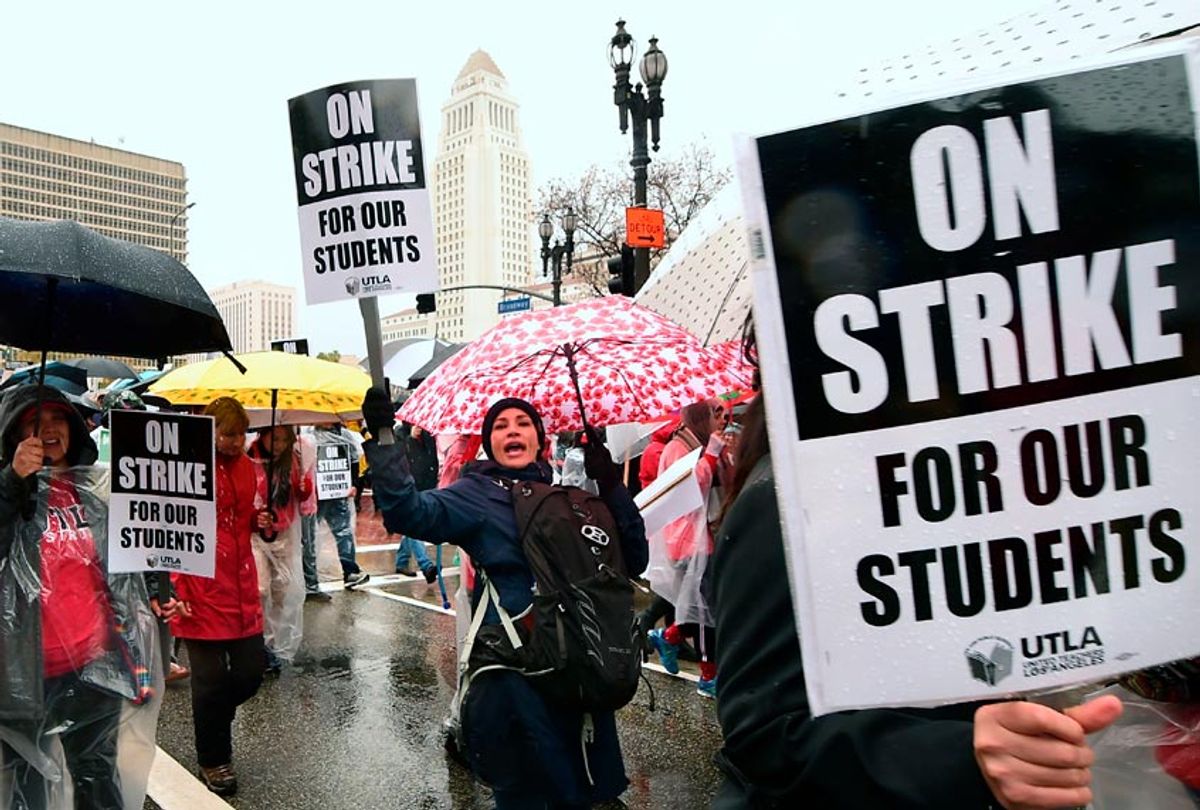An ominous downpour soaked usually-sunny Los Angeles on Monday as nearly 35,000 public school teachers kicked off a strike demanding basic needs for their schools and students.
“We are standing in the rain today, it is miserable and horrible, but the energy you can feel from these folks saying ‘enough is enough’ is amazing,” Lily Eskelsen García, President of the National Education Association, an affiliate of United Teachers Los Angeles (UTLA), told Salon.
Today, Monday, January 14, marked the first day of a widespread teachers' strike that had been brewing for years. Although the teacher's demands include salary increases, the union's main strike priority is restoring resources in Los Angeles's public schools, as a slow reduction in the past decade has resulted in the loss of basic support services like school nurses, counselors, and social workers. Teachers are also demanding smaller classroom sizes: García tells Salon that some elementary teachers have reported up to 45 elementary kids in a single classroom.
These cuts came during a decade in which LAUSD administrators sought to defund and privatize many of the schools in the district, despite a lack of evidence that charter schools are any better than public ones. Charter schools are effective in taking accountability away from parents and citizens and transferring it to unaccountable private interests, which is why billionaire technocrats and conservatives adore them.
Though this is the first Los Angeles Unified School District (LAUSD) teachers' strike since 1989, it is one of several across the nation over the last year. Previous strikes in West Virginia, Oklahoma, Arizona, and Kentucky led to significant wins for teachers in those states.
García said the LA Unified School District Superintendent Austin Beutner and the school board do not seem to understand that when a school is underfunded, teachers have to pick up the slack.
“I have heard from some teachers buying their own supplies, saying ‘I go down to Costco to get breakfast bars because I have too many kids who show up to school hungry,’” García explained.
The strike impacts nearly 500,000 students at 900 schools, which reportedly have remained opened but are staffed by substitutes hired by the city.
The strike raises an interesting paradox: unlike last year's teachers' strikes, which were largely in red states, California is deep blue and getting bluer. Yet unlike many blue states, California spends little on public education comparatively; the state's public education spending is half what New York's is.
There is a hint of classism at play in the political neglect to Los Angeles's public schools, as LA's schools have a high percentage of students who consider English as their second language.
“How do you plead poverty? The superintendent and school board say we don’t have the money, but they are sitting on a $2 billion reserve. They have plenty of money... $600 million is what they have taken every year, out of the public system to fund [c]harter schools," García noted. "Some of them are excellent, and some of them are scams and grossly incompetent,” she added.
Much of the decline in support for Los Angeles public schools derives from a neoliberal political project to privatize and charterize many of the public schools. A loss of enrollment due to competition from charter schools is a big part of the problem, teachers say. Indeed, Superintendent Beutner's privatization strategy was previously leaked to The Los Angeles Times.
“Austin Beutner should be figuring out how he spends the record-breaking $1.86 billion in reserves on urgent student needs, instead of spending time with high-priced, unaccountable consultants plotting the downsizing of a district that serves all students,” UTLA President Alex Caputo-Pearl said at the time the report was leaked.
In an op-ed for PBS, journalism teacher Adriana Chavira wrote about the impact charter schools have had on the public school system.
“I’m striking to stop charter schools from draining our schools,” Chavira wrote. “In addition to seeking lower class sizes, more counselors, nurses and librarians and a pay raise, the United Teachers Los Angeles (UTLA) is asking that LAUSD stop approving charter schools, which have seen a 287 percent increase in the district’s boundaries since 2008.”
Additionally, she emphasized there is a pressing need for college counselors.
“The district doesn’t provide a college counselor for my school,” she wrote. “Did I mention that our school has 100 percent graduation rate? At least 97 percent of our graduates continue to college (both two-year and four-year university paths). A retired volunteer college counselor comes in and works with our students when she can. And when she’s not here, our guidance counselor steps in and helps students through the process of going to college, especially since many are the first in their families to go to college.”
Today’s strike has caught the attention of politicians in California, as well as those across the country.
“So very proud of LA public school teachers today for taking a stand,” Rep. Alexandria Ocasio-Cortez (D-N.Y.) wrote on Twitter. “Teachers are the unsung heroes of American democracy. Today they’re putting everything on the line so our nation’s children can have a better shot.”



Shares